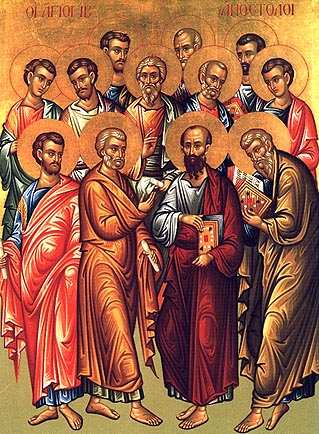Introduction
It may seem odd for someone who identifies as a "Traditionalist" to be penning an essay with this title, which has been adopted by a notorious group of Liberal Catholics. I hope the reason will become apparent, as I review my understanding of Catholic teaching on the constitution and role of the Church. The writing of this article was partly stimulated by an intervention by Dr Paul Miller and partly by a conversation with Dr John Sackett. References such as [Ott IV.2.9] relate to Dr Ludwig Ott's book: "Fundamentals of Catholic Dogma" [Tan publishing (1974)]. Reference such as [CCC 787-795] relate to the new "Catechism of the Catholic Church" [Geoffrey Chapman (1994)].In this essay, I first discuss various models of the Church; then I consider what the purpose of the Church is. I then argue that it is necessary for the life of the Church to be governed in various ways, and briefly describe the form of authority that exists within the Church to discharge this function. Finally, I discuss the contemporary breakdown in Catholic Order and to what extent this undermines the coherence of the case I have attempted to make.
Models of the Church
I well recall becoming increasingly frustrated and then angry at a meeting held many years ago at Westminster Catholic Cathedral, in London where a theologian set out to discuss various "models of the Church". The reason for my disquiet was that he first used this phrase to suggest that none of the accounts that he called models were correct and that because of this all were just suggestions each having an equal status: to be adopted or rejected according to one's personal preference. He then made quite clear what his personal preferences were and suggested that anyone thinking differently was ignorant. This is the typical strategy of the Liberal.As a Physicist, I use the word model in a different way. In my language, models are useful approximations, which focus on certain aspects of a complicated system and its behaviour, neglecting some details which may occasionally be important, but which can often be ignored. Different models are appropriate in different circumstances, as different behaviours are elicited by different stimuli or contexts. Moreover, models can be used to give insight into the activity of a system as comparisons with other systems or simple ideas that one is familiar with or can fully analyse. This kind of model is more properly called an "analogy" and is the kind of thing we are dealing with here.
If a behaviour or insight associated with a model in fact corresponds to objective reality, then it is true and the model is useful for explicating this truth. It cannot be arbitrarily set aside just because another model is found to be useful or to be preferred in other circumstances: unless this second model fully reproduces the behaviours predicted by the first. Even when a second model could be used to supersede a less sophisticated predecessor (e.g. General Relativity and Newtonian Gravity) it is often wise to retain use of the simpler model when it can be applied, because it gives a clearer insight into common-place realities which would otherwise be lost like a needle in a huge stack of complicating hay.
I shall next discuss six "Models of the Church". In each case I shall try to explain its origin, its utility and its defects.
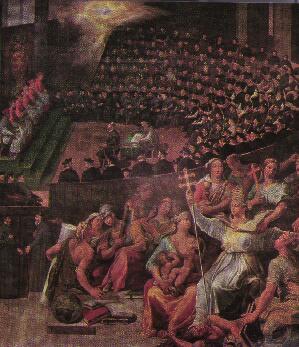
The Perfect Society
This was an analogy favoured in post Tridentine papal teaching until the 1960's [Ott IV.2.3.2]. Pope Leo XIII featured it in his encyclical "Immortale Dei". It envisaged the Church as a cross between a State and a "voluntary association" or "club". The difference being that it was God's State or Club and so its objectives, rules and governance were divine in origin and so perfect. Because they were perfect they were incapable of improvement and so should be entirely immutable. In particular, the Divine State was a feudal monarchy, with Christ as King and the pope as His infallible regent. Moreover, like the secular state, the Church is founded on the family.Obviously, the theologian lecturing me at Westminster all those years ago didn't very much like this paradigm. Equally obviously, I don't like it: as here expressed. It is much too "top down" and "militaristic" in character. However, giving the analogy a different spin transforms it into an altogether more congenial form:
- The Church is an association of individuals with a common aim and purpose.
- Its constitution is divine [Ott IV.2.10.1]:
- The objective is to manifest and mediate the Gospel to everyone. [Mat 28:19-20]
- The governing principle is "Love and do as you will". [St Augustine]
- No account is to be made of wealth, social class, race, nationality or sex. [Gal 3:28]
- Those who do the Will of God are true family. [Mat 12:50]
- "The Spirit will lead you into all truth." [Jn 16:13]
- "What you bind and loose on Earth is bound or loosed in Heaven." [Mt 18:18, Jn 20:23]
- "The greatest among you must be the Servant of All." [Mk 9:35]
- "On Peter will I build my Church." [Mt 16:18]
- This irreformable Divine Constitution (a Platonic ideal) :
- is a blue-print for a Perfect Society.
- However, it is of necessity implemented in practice by fallible human agents.
- Hence its form can only be realized imperfectly,
- and this realization is always capable of improvement.
The Body of Christ
This is the Apostle Paul's favourite analogy [1Cor 12:12-31]. Whether he knew it or not, St Paul is using an image that was earlier employed by Plato, in book Five of "The Republic" to describe the ideal human society. The Apostle describes the Church as having a diversity of parts that act together with a common life. While some parts might be more important than others, according to various ways of evaluating importance, all are necessary: and those that do not automatically attract admiration should be singled out for praise. He makes it clear that there are a variety of roles: of which the Apostolic hierarchical ministry is only one, though the first [1Cor 12:27]. He makes it clear that the common life is instigated by Baptism [1Cor 10:2,12:13], nourished by the Eucharist [1Cor 10:3-5;16-17,11:23-30] and is characterized by Love [1Cor 13].The only deficiency of this model [CCC 787-795] is that it doesn't give any clear guidance as to how the Church (especially as a world wide body) is to be realized in practice, which is where the previous model of "The Perfect Society" scores very highly.
 The
Family of God
The
Family of God
This is a familiar image. On the positive side:
- It relates to most people's personal experience,
- and so means something specific to them,
- especially in terms of "give and take", mutual respect, support and love.
- St Paul often calls Christians "brothers" (in what I'm sorry to say is a rather sexist way).
- He does so with the thought that God is their father,
- not himself or some other hierarch.
- It communicates the idea of parental authority as the basis of the Church.
- It is male dominated.
- It undermines the idea that Christian leadership is that of the servant.
- It suggests that the main source of the Church's membership is procreation not proselytism.
- Perhaps to the extent that the Church becomes ghettoized.
- It suggests that the Church is constructed from secular families.
- Perhaps to the extent that family boundaries become fracture lines in the Church Community.
- Not everyone is as lucky as myself, to have had a generally good experience of family life.
- For those who have not, this model will be alienating, especially for those who have experienced
- divorce, or
- physical, emotional or sexual abuse from members of their family.
- When coupled with the idea of "Child of God" it encourages the laity to think of themselves as:
- dependent on and passive to the hierarchy, just there "to do as you're told" and "to be seen, but not heard";
- quite properly ignorant of doctrine;
immature, spiritually.
Communion of Saints
This is one of the two favourite models of the theological revolution that took place in the 1960's. Formally, it is quite harmless and even insightful. Practically, it has been deeply damaging. It stresses the multi- and bi-lateral nature of all relationships in the Church: the interconnectedness and mutuality of all Her members, the fact that none can stand alone, and the self-correcting nature of the dialogue that goes on as they ponder on and try to implement the Gospel.In particular, it is applied to the Magisterium. It proposes that the office of Pope is that of the President of the College of Bishops, and that his particular role is to be their definitive spokesman. While a Bishop not "in communion" with the Pope is no real Bishop, a Pope "at odds with" the College of Bishops is no real Pope.
This is all well and good, and those readers familiar with the general
tone of my writings will understand that I welcome this paradigm. However,
it is just as apt for misuse as "the Perfect Society": but in the opposite
direction. It can be used to elevate the governed above the governors,
and in particular professional (or, I suppose, amateur :-) theologians
above the Magisterium. Now I have argued elsewhere for the rightful place
of prophets and teachers to be recognized,
alongside that of the priest. Nevertheless,
it remains true that it is the role of the priest to "discern the spirits"
and rule (sometimes infallibly) on matters of dispute: when the time is
opportune. The Church may be a Communion or Fellowship, but it is no more
a Commune or Democracy than it is an Autocracy or Monarchy.
Pilgrim People of God
This is the second fashionable model. Once more, it is formally harmless and insightful. Once more it has been used by Liberals to much ill effect. The main point of this paradigm is that to "belong to the Church" is not to have "arrived", but rather to have taken up with a pilgrimage. Now in the sense that the Church as a Whole is always in need of renewal and has much to (un)learn in accordance with the guidance of Holy Spirit ("a Pillar of Fire by night and a Pillar of Cloud by day" [Ex 13:21]), this is all well and good. Of course, this dynamic image was particularly intended by the liberal theologians behind the documents of the recent Vatican Synod to oppose the static image associated with "The Perfect Society". Even so, all well and good: what was needed to renew the 1950's Church was just such a re-balancing of style and practice, in fact this was long overdue!Calamitously, these theologians intended far more by it than this and subsequently used it to devastating effect. The image of pilgrimage could be used to justify the rejection of any tradition and in fact Apostolic Tradition itself! The argument would always be that "This tradition that you cling to is baggage weighing the Church down, tying it to the past. It must be discarded on the journey to the Promised Land. What may have been true or helpful in days gone by has to be replaced by New Ideas and New Ways. The Faith is not timeless, but has to be adjusted in order to be conformable with and attractive to modernity."
Hence Modernism, for so long repressed (but never answered or defeated) took possession of the Church, as the "People rose up to play" [Ex 32:6].

Kingdom of God's Friends
Needless to say, this is the paradigm that I favour and champion. I have written at great length on friendship elsewhere, I reproduce a little of it here.Some while ago, Dr Paul Miller pointed out to me that the twelve disciples grouped about Jesus was similar in form to an adolescent friendship group: or indeed a gang! Of course, a major difference was that some (and possibly many of the disciples, though not Jesus) were married. This, together with the penumbra of "women followers" and the "household of Martha, Mary and Lazarus at Bethany" was the nascent Church. Later on it was augmented by "the brethren of Jesus".
The basic human value championed by Christ, the ideal that all else should be judged by and all should aspire to, was friendship [Mat 12:46-50]. Jesus' preaching of the Kingdom of God should be understood in a very simple way: namely the proclamation that the solution to all the world's woes is the general adoption of mankind of the paramount virtue of friendship. Our Lord cautioned that unless we "became as children": for whom friendship is typically second nature, we could not hope to enter the Kingdom of God [Mk 10:14-15]. This is a simple and practical message. One that is comprehensible by all [Mt 11:20] and would be very simple to adopt. I suspect that the reason there has been only a limited uptake of the idea, both within and without the Church is that other strategies of behaviour tend to work better, unless a friendship group has a certain size. Hence the instinct of many who take the faith particularly seriously to adopt the religious style of life, one based on community, commonality and equality rather than on family and hierarchy.
The utility of this model is that:
- It features the interdependence of the "Communion of Saints" paradigm.
- It features the respect and mutual support of the "Family of God" paradigm.
- It focuses on the greatest love [Jn 13:34;15:12-17] as being constitutive of the Church.
- It is not sexist and is altogether inclusive (Catholic).
- It de-emphasizes power structures and authority in favour of persuasion and dialogue.
- It de-emphasizes secular and familiar ties in favour of spiritual affinities.
- It is open to the Divine Constitution of "God's Perfect Society", outlined above.
Functions of the Church
It is not possible to live an adequate Christian life in isolation from the rest of the Church. We need each other just as much as we need God: because typically God comes close to us in and through other people. God is Love. The Trinity is Community. To share in the Divine Life cannot but involve participating in the Common Life of the Church. To cut oneself off from the Catholic Community, even when it is in an understandable reaction to the knowledge that it is a very imperfect realization of the "Perfect Society of God's Friends" is to do oneself a great disservice.All of the legitimate functions and activity of the Church can be subsumed within the concept of "evangelization". This is the mediation and manifestation of the Life of God to the World (which, of course, includes the members of the Church).
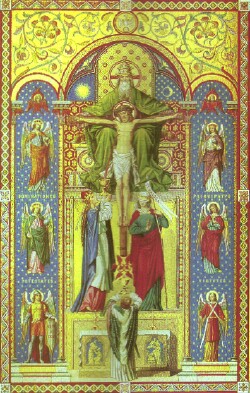 Worship
Worship
Worship is the most characteristic aspect
of the life of the Church. It is not about serving, honouring or paying
homage to God. The Holy Trinity has no need of any such. Neither is it
about attempting to bribe or flatter God. The Holy Trinity is immune to
all such. Worship is about making love with God, enjoying God, rejoicing
in God and celebrating God.
Worship is for the good and benefit of the worshipper, not the worshipped. Hence it is a form of Evangelization. It manifests and mediates the life of the Trinity to the worshipping community. It is implicated in many of the other activities listed below. If it is properly performed, it will be edifying and inculcate fellowship. Witnessed by outsiders, it will impress on them something of the majesty and wonder of God and be of itself an effective means of evangelism. The synaxis that nowadays always precedes the Eucharist affords opportunity for prophecy, teaching and preaching.
The Eucharist
For all the reasons just listed, Christian worship is pre-eminently the Eucharist. In the Holy Sacrifice of the Mass, God is the agent: not (wo)man. God is the priest, God is the victim, God receives the offering, God returns the offering to be shared in the Sacred Community Meal. All (wo)man does is witness the Divine drama (liturgy) and allow him/herself to be caught up into the great Ecstatic Fellowship of the Eternal, Undivided and All Blessed Trinity.The Work of Worship
Of course, it is possible to celebrate God in more mundane ways. Through architecture, sculpture, painting, music and drama. All these things, and in fact all human activity (even hobbies, one's daily paid work or the production of web sites :-) can be dedicated and offered to God, and the Divine be encountered within the activity and/or its product. Hence, instead of subsuming all the Church's life under the heading "Evangelization", Worship could have been used as the universal category. I am sure that Mother Teresa considered the specific actions of her ministry to the dying poor in Calcutta to be worship: after all, Jesus tells us that "if you do so unto the least, you do it unto me".The Divine Office
Pre-eminent in all such forms of exterior worship is the Divine Office of the Church, because it is the Official and Communal prayer of the People of God. Moreover, in the Western Rite (I am ignorant of Eastern practice) it is largely composed of the Psalms and other Scriptural canticles: so the Mystical Body of Christ sings the Word of God to the Divine Word who is both Her Spouse and Head.Personal Prayer
Contemplation, meditation and prayers of adoration and thanksgiving in general are the highest callings of the human person. They constitute the private life that the Christian has with the Trinity. They are truly aspects of Evangelization, as they temper the personality to a more faithful imitation of Christ; in that aspect appropriate to the particular disciple. Moreover, they are a source of solace to the Sacred Humanity of Jesus; which continues to endure much anguish because of the ruin of souls. Even in the case of the hermit, they must lead back to a concern for the both the World and the Church as Community, whose well-being will certainly feature in the heart of any (wo)man close to the Heart of Jesus.In the western tradition, the Rosary has a special place. In the eastern tradition, the "Jesus prayer" has pride of place.
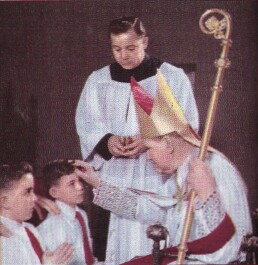 Edification
Edification
By edification, I mean teaching, spiritual direction and discipleship,
and the sacramental life of the Church.
The Sacraments
Apart from the Eucharist, Jesus gave to His Apostles (either in his own person or through Holy Spirit) six sacraments properly so called. These are Baptism, Confirmation (or Chrismation), Penance (or Confession or Reconciliation), Anointing of the Sick (or Extreme Unction), Matrimony (or Marriage) and Orders. They punctuate and give shape to the Christian life story, they are "rites of passage". Each works "ex opera operatum", which means that they are symbolic acts which nevertheless have objective effects. In each case they cause or bring about the effect that they symbolize. They do this by being Divine Testimonials. Although God is not limited to act only within and through the Sacraments, He has undertaken never to neglect to act through them. Whenever the symbolic act is adequately manifested, by a minister with sufficient authority and appropriate intention (and the technical details of the first and last conditions are very easily met) then God promises always to act to forgive, heal, strengthen, grant authority or whatever.The sacraments are a great help to flawed (wo)men in the sorrows and perils of life. They are moments of commitment: anchoring points by which to tether the tent that is else too liable to be carried off in the gales of uncertainty. As encounters with God, they are all Epiphanies of Grace and contribute to the Evangelization of the Church.
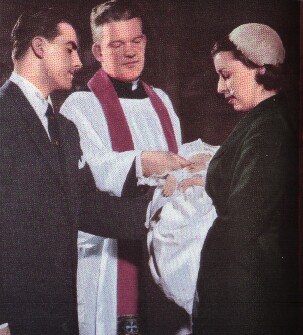 Sacramentals
Sacramentals
In addition to the Seven Sacraments, the Church has developed other symbols
that are sacramental in nature. Some are quasi-ordinations to ministerial
roles such as Acolyte, Lector or Subdeacon;
some are objects like ikons and votive candles; some materials like the
three oils consecrated at the Chrism Mass on Maundy Thursday and holy water;
and some actions like making the sign of the cross or the Maundy Thursday
washing of feet. These mediate grace, but are not generally of Divine Institution
and often do not even pretend to cause what they symbolize: what
exactly does the sign of the cross symbolize, and what exact
effect is the sign of the cross supposed to have? These sacramentals
do not work "ex opera operatum" but only in accordance with the faith and
devotion brought to them by those who make use of them. Of course, when
a sacramental such as Sacred Chrism or the Oil of the Sick is used
in the context of a Sacrament (i.e. confirmation, ordination or Extreme
Unction) then the entire action has an objective "ex opera operatum" effect.
Teaching
This relates to the intellectual development of the Church Community. It gives direction, purpose and focus to its life. It enables the disciple to judge what (s)he should do in the circumstances of daily life that beset him/her. It guides the penitent as how to best cooperate with grace. It educates the evangelist to effectively articulate the Gospel to his/her neighbours. It equips the priest to discern the spirits.Intellectual belief is only important in as far as it leads to acts of friendship. Of course, as a Platonist, I would argue that perfect knowledge (episteme) is the sole basis of virtue, while sadly accepting that orthodoxy (correct belief) is not at all the same thing.
Spiritual Direction and Discipleship
This is how the Church Community facilitates the continuous process of conversion, repentance and sanctification that characterizes the authentic Christian life. It is also an aspect of fellowship, so I will consider it properly there.
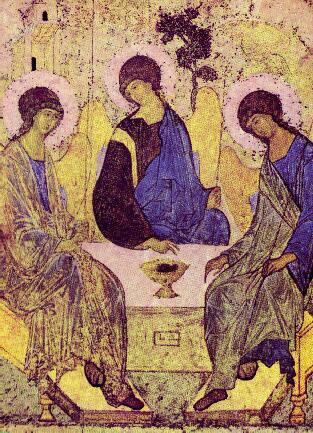 Fellowship
Fellowship
This is just another name for friendship. It should be manifested in terms
of mutual support and sharing; encouragement and criticism; recreation
and enjoyment. If being a Catholic, a member of the Church, isn't fun then
something is wrong. The experience of worship, in particular, should
be uplifting and enjoyable. While the liturgy is not light entertainment,
it is drama and should fully engage the emotions; though not necessarily
in hugely demonstrative ways. Prayer and Evangelism and Service
to Others should also be rewarding and self-affirming rather than self-denying.
Virtue is its own reward, and it is proper to take delight and have pride
in the work that God enables one to effect, by His grace.
There is also a place in the Common Life of the Church for simple human Fun. Jesus said that he came so that His followers should have a more abundant life: not that they should be miserable sour pusses! Partying, sports, rambling, amateur dramatics and singing, arts and crafts etc etc are all things that can be shared in simply for the sake of their enjoyment. Moreover, doing so will tend to deepen relationships that already exist and serve as pretexts to develop others that did not previously exist. Again, some of these activities can be turned to specifically religious use: to enhance worship or as means of evangelism or teaching. Still others can be seen as means of serving the local community (e.g. providing a youth club or toddler's play group) and may then accidentally serve as ways to evoke interest in the life of the Church from those who have no prior interest in or knowledge of the Catholic Faith.
Groups should exist for
- common prayer and Bible study;
- social and political action;
- catechesis and religious instruction;
- emotional and practical support;
- spiritual direction and discipleship; and
- the discussion of theology and philosophy.
Moreover, there should be pastoral mechanisms in place to alert the Community to the problems, difficulties, trials and needs of individuals and families. The only problem here is that any mechanism effective enough to respond adequately to the crises that impact upon daily life is likely to be intrusive and risk invasion of privacy. Of course, if the Church was truly "the Perfect Society of God's Friends" there would be no issue of privacy. Unfortunately, it is not: so there is!
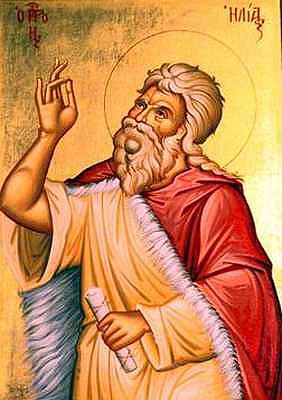 Prophecy
Prophecy
This is both a function within the Church and also a role of the Church
Community as a whole, sometimes speaking through its leaders or other representatives
[CCC
904-907]. Within the Church, prophets have the role of keeping the
Community aware of the radical nature of the Gospel. They are holy irritants,
reminding both priests and people of awkward facts when they are inclined
to take an easy path leading to "the destructions".
Similarly, the Church has a prophetic role as regards the State. She should remind rulers and officials of the demands of justice and equity, both in the making of laws and the execution of policy: and denounce them when they fail to adhere to objective principles. Sometimes She should encourage, or even instruct, her members to take political action: even contrary to the law of the State, if that law is unjust.
Evangelism
Evangelism is the personal responsibility of every baptized and especially every confirmed Catholic [CCC 863,900]. How this responsibility is discharged depends very much on the personality, gifts and circumstances of the individual [CCC 864]. No one model should be imposed. For some, evangelism might be restricted to an aspect of their contemplative prayer. For others it might be undemonstrative works of charity, which evoke the question "why does (s)he bother to do this?" For most people, it should involve giving the occasional sincere, articulate and convincing verbal account: of what the Catholic Faith is, and why they believe it to be true. This evangelistic dialogue should engage colleagues; friends; family members; neighbours, acquaintances; and other people that the lay Catholic happens to meet in their every day life.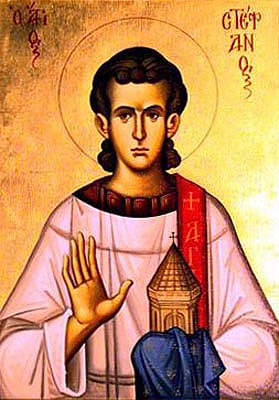 The
presumption popular in contemporary Catholicism: that it is generally sufficient
just "to live a good life, and so set an example to others" is so far from
true as to be scandalous. Even within the family, evangelism is often devolved
to the school: parents not feeling equipped to give an account of the Faith
even to the captive audience of their own children! This manifests the
entire deficiency of contemporary
catechesis. Recently a corespondent wrote to me:
The
presumption popular in contemporary Catholicism: that it is generally sufficient
just "to live a good life, and so set an example to others" is so far from
true as to be scandalous. Even within the family, evangelism is often devolved
to the school: parents not feeling equipped to give an account of the Faith
even to the captive audience of their own children! This manifests the
entire deficiency of contemporary
catechesis. Recently a corespondent wrote to me:
"I wish you had taught my RICA class. Our director of religious education decided to present catholic teaching on a level suitable for twelve year olds. She was concerned that the people in the class would become confused or bored with a more advanced presentation of the faith. I have been in church since I was a toddler so her presentations had only a little new information for me. My sponsor did help me outside of class with other books but they were basic as well."To an extent it is possible to conduct evangelism as a private individual. The encounter of the deacon Philip with the ethiopian eunuch shows this to be true. However, effective evangelism must always lead the enquirer to the catechumenate of the Church where they should receive an authentic account of the Gospel message rather than any partial or idiosyncratic view (such as propounded on an unregulated web site :-) In today's situation, where Catholic Order has broken down, this requirement is highly problematic. Another correspondent recently wrote to me:
When witnessing to Paul Hammond it was always a real concern to me what would happen when he first encountered the contemporary Church. I was very much afraid that he would be scandalized by the irreverence and liberalism. I was very much aware that if I had been aware of the true situation in the Catholic Church when I was an undergraduate at Cambridge, I would have been put off from converting. Providentially, every parish that he ever had anything to do with on the run up to his reception into the Catholic Church was exemplary, by today's standards. The congregation of one in which he was received was still in the habit of receiving communion kneeling when he first started attending: though this was subsequently discontinued and "lay ministers of the Eucharist" introduced soon after. In fact what then happened is that Paul was recruited by reactionary forces within the Church and utterly repudiated me, to my great sorrow and pain."It's true, we have lost so much in all the confusion. Does anyone know what a real Catholic is anymore? I had an argument with a lay Carmelite last week along these lines. Apparently no-one has any backbone to stand up and say 'this is not my tradition or my belief'. How far away will the Spirit let us drift away before towing us back in?"
Service
Here I include both alms giving (incorporating fund raising) and the dedication of personal time and resources for the improvement of society. The latter might involve caring for the weak and marginalized; or visiting the sick or lonely or imprisoned, for example. Some of this can best be done as an individual and some best as part of secular groups without the backing of the Church. However, the Church Community itself has a part to play in such endeavours. The Gospel has a particular spirit and distinctive perspective to bring to bear in many situations of suffering or injustice, and it is wrong to down play the Church's specific role in caring for the needy.
 Authority
within the Church
Authority
within the Church
It is necessary for the life activity of any complex
organism to be regulated, whether it be a protozoan, an ant
hill or a sports club. The Church is no different from any other body.
For the effective discharge of Her Mission and the tranquility of Her members
it is necessary that decisions are made, orders carried out and activity
monitored and organized. I am not suggesting that the Church should be
a "top down", "chain of command", "militaristic" or "corporatist" structure.
Far from it. Communication should be two-way. Nevertheless, forms authority
must exist and be respected: for the good of all. Of course, most decisions
should be consensual and arrived at after consultation and debate. This
norm is manifest in Traditional Synodical practice.
The only authentic Christian Authority is that of the Servant, the pagan concept of "Lord and Master" has no place in the Christian Religion. Even Our God and Lord Jesus Christ showed that His Kingship was a form of service when he washed his Apostle's feet at their last supper and then called them his friends. Jesus provided for His Church's need for governance in two ways. First: by the commissioning of Apostles, with the authority to sacramentally ordain helpers and successors [Ott IV.2.4]; and second: by a more general bestowal of Holy Spirit on the Church [Ott IV.2.11, CCC 797-798].
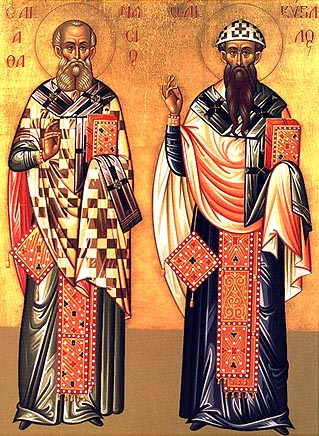 Holy
Orders
Holy
Orders
Part of what the sacraments do is grant certain kinds of authority. This
is especially true of Holy Orders, which is precisely the means of passing
on the Apostolic authority. The two other "sacraments of initiation"
also confer authority. Every
baptized Christian
is called to be a witness to the Kingdom values of the Gospel in his or
her everyday life. All Christians are called to exercise a ministry
of hospitality, compassion and friendship
towards each other and to the world at large.
It should be noted the authority granted by Holy Orders has two (quite distinct) roles:
- The first is the authority to confect the sacraments.
- This kind of authority is enabling.
- Without it something is impossible.
- With it the thing becomes possible.
- The second species of authority within the Church is "regulatory" authority.
- This might also be termed "pastoral" or "juridical".
- In the last analysis, it is disabling.
- It is easier to stop something bad from happening,
- This is the prime role of hierarchical authority:
by issuing a condemnation; than to initiate something good!
to warn that certain ideas are dangerous and to forbid certain actions.
immediately proceed to the role of the Pope should not be taken to signify that I think that the only significant authority in the
Church is that of the Vatican Curia: far from it!
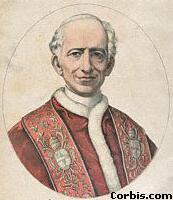 The
Papacy
The
Papacy
I shall not labour the arguments surrounding the Divine appointment of
St Peter [Ott IV.2.5] and his successor [Ott
IV.2.6.1], the Pope of Rome [Ott IV.2.6.2],
as the Chief Ruler of the Church [Ott IV.2.5].
Indeed, I have covered these issues here.
Moreover, I have described the role of the Pope within the Divine Constitution
of the Church, as it has come to be understood in the Living apostolic
Tradition here.
In the pre 1960's Church, the Pope was often portrayed as an Absolute
Monarch, though he rarely behaved in such a manner.
More recently, the papal office is generally portrayed in a cosy, friendly,
consensual terms. Unfortunately, both Pope Paul VI: regarding both hormonal
contraception and the imposition
of the Novus
Ordo Missae, and Pope John Paul II: most especially regarding "women
priests", have tended to act imperiously.
Prophets and Teachers
This kind of "hierarchical" authority is not the only form of authority that operates within the Church. It has to contend with that of Prophets and Teachers. Each of these dynamics has its proper place in the life of the Church. The Prophet encourages and denounces; the Teacher explains, criticizes and persuades; the Priest listens and decides.The Contemporary Situation
Unfortunately, the ideal situation I have sketched out above is presently not realized well in practice. From a UK perspective the true situation is that:- The only Western Rite Bishop that ever acts like one is the Pope, all the rest act like "administrators".
- I recall that when Maurice Coeve de Murville was appointed Archbishop of Birmingham, he told me that his first response to the Apostolic Delegate had been to ask him:
- There is considerable tension between the Episcopate and the Papal Civil Service: "the Curia".
- Generally over petty issues of who is in charge of what.
- The Curia is generally populated with conservatives.
- The Episcopate is polarized between liberals and conservatives.
- The Presbyterate is overwhelmingly liberal.
- The vast majority of theologians are modernists.
-
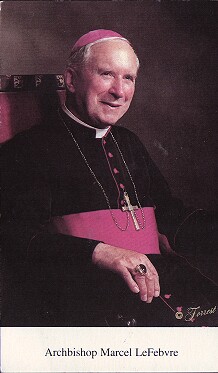 A
substantial number of orthodox "Traditionalist" Catholics have been
excommunicated by the Pope.
A
substantial number of orthodox "Traditionalist" Catholics have been
excommunicated by the Pope. - There is a general atmosphere of fear, distrust and acrimony, which makes open constructive debate and dialogue impossible. Hence this web site!
- The focus is on managing decline, not renewing the Life of the Church.
- At the same time, little acknowledgement is made that the Church is in decline!
- Because this would mean admitting that the Post Vatican II experience has generally been negative and much of what was implemented in the name of that synod was pastorally disastrous.
- The Parish is seen as a sacrament production line, rather than a Christian Community.
- Very few of the functions that I outlined above are being discharged.
- The Church's worship is a cause of dissension, not fellowship.
- Catechesis and Discipleship training is utterly inadequate.
- Preaching is of an abysmal quality.
- Evangelism is hardly ever attempted.
- Fellowship and mutual support is generally neglected.
- Significant lay involvement in ministry is generally impeded.
- Clericalism is still rife.
- The rapid decline in the number of presbyters is being addressed in expedient terms.
- The only doctrinal matters on which the Papacy seems willing to take a stand are related to sex, gender or reproduction. In most of these matters, I fear it is largely mistaken.
- Hormonal Contraception.
- In vitro fertilization.
- Abortion.
- Divorce and Remarriage.
- Sexuality.
- The Ordination of Women.
- It has backpedalled on the Defined Teaching of the Oecumenical Council of Trent regarding Justification.
-
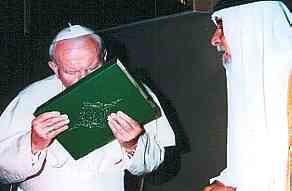 The
Pope has toyed with syncretism by hosting the two Assisi congresses of
"World Religions" and by kissing a copy of the Koran!
The
Pope has toyed with syncretism by hosting the two Assisi congresses of
"World Religions" and by kissing a copy of the Koran! - There is a general break-down in the rule of law, with most Bishops acting as arbitrary tyrants.
- When liturgical abuses are brought to Episcopal attention,
- When sexual abuses are brought to Episcopal attention,
- The only exception being in the area of sex and the laity, where the rules are rigidly applied, at least formally.
- However even here, all that matters is a profession of faithfulness to the rules, not actually keeping them!
"But what do I know about administration?"
the complainant is generally ignored, vilified or told to shut up.
the complainant is bribed to keep quiet and the offences covered up.
Pope Paul VI, who was largely to blame for all the above, had the
decency to admit the truth publicly on three occasions:
"The Church finds herself in an hour of anxiety, a disturbed period of self-criticism, or what would even better be called auto-destruction. It is an acute and complicated upheaval, which nobody could have expected after the Council. It is almost as if the Church were attacking herself.
We looked forward to a flowering, a serene expansion of concepts which matured in the great sessions of the council ... one must notice above all the sorrowful aspect. It is as if the Church were destroying herself."[Pope Paul VI, 7 December 1968, Address to the Lombard College]
 I
disagree that this process of auto-destruction was something "which
nobody could have expected after the Council."
I
disagree that this process of auto-destruction was something "which
nobody could have expected after the Council."
"We have the impression that through some cracks in the wall the smoke of Satan has entered the temple of God: it is doubt, uncertainty, questioning, dissatisfaction, confrontation ..... We thought that after the Council a day of sunshine would have dawned for the history of the Church. What dawned, instead, was a day of clouds and storms, of darkness, of searching and uncertainties."Again, I must say that Paul VI was naive in saying "We thought that after the Council a day of sunshine would have dawned for the history of the Church."[Pope Paul VI, 29 June 1972, Daily Audience: on the occasion of the 9th anniversary of his pontificate.]
“The tail of the devil is functioning in the disintegration of the Catholic world. The darkness of Satan has entered and spread throughout the Catholic Church even to its summit. Apostasy, the loss of the faith, is spreading throughout the world and into the highest levels within the Church.”Fifteen years after the Council, Pope Paul VI is reported to have said the following to his friend, Jean Guitton, in private:
[Pope Paul VI, October 13, 1977, Address on the Sixtieth Anniversary of the Fatima Apparitions.]
"There is, at the present time, a great disorder in the Church, and it is the Faith that is at stake. When I consider the Catholic world, what frightens me is that it seems that a non-Catholic way of thinking seems to be becoming prevalent within Catholicism itself, and that it could even happen that this non-Catholic way of thinking could take over in the future, although it will never represent the mind of the Church."'Or as my friend, Dr Paul Miller put it to me, recently:
"The Church, rightly or wrongly seems more focused on keeping itself going, as though passing out the Sacraments is its raison d'être, along with taking stances on human issues (like sex and sexuality that it knows nothing about) that have very little to do with religion: while a church should be about bringing us closer to God, in my view."
 Or
as Mr Paul Hammond expressed it:
Or
as Mr Paul Hammond expressed it:
".... the more I discovered what the life of a typical parish priest is like, the more turned off it I became. Remember that my main experience of the Church has been through the new movements and through St Mary Moorfields, not through typical parishes, which I've now discovered are primarily non-stop Mass / baptism / confirmation / marriage / funeral / counselling factories."Even so, I believe that it is worthwhile being associated with the visible fellowship
This is because apart from all her mundane blemishes, She is the best manifestation there is of the Perfect Society of the Friends of God. To purposefully separate oneself from Her is to purposefully separate oneself from that Divine Fellowship and the sacramental means of grace that She offers. To join Her Communion is neither to approve of nor participate in Her imperfections: but only in the ideal that informs Her and gives Her life. Outside Her boundaries there is no true worship, no justification, no charity: for wherever these are She is invisibly present at least.
In the end, as a (wo)man of faith and good-will you will be joined to Her. This is inevitable, as you are a friend of God, and the Church knows Herself as nothing other than The Kingdom of God's Friends. Remain outside Her boundaries while you live and you give free reign to those who even now further corrupt Her life: either purposefully or through ignorance.
I grant that She is in a parlous state at the moment: perhaps you will be able to contribute to Her healing!
I grant that association with Her will be a cause of trial for you: but Our Lord asks each of His disciples to take up the cross set before them and carry it faithfully.
In any case it is not too great a burden to bear, if only one keeps a proper perspective. Our Lord's call to St Francis of Assisi was "Francis, rebuild my Church", and that holy man did not flinch at the enormity of the task set before him.
